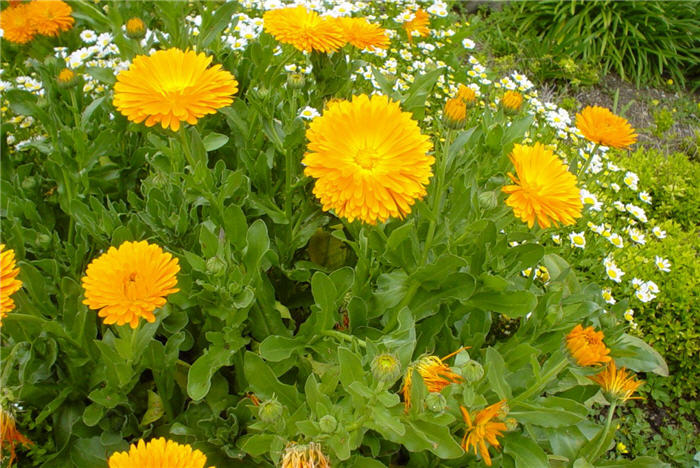| Botanical Name: Calendula officinalis | |
| Common Name: Calendula, Pot Marigold, Poor-man's |

-
Anatomy
-
Culture
-
Design
Plant Type
Annual, Herb
Height Range
Under 1', 1-3'
Flower Color
Gold, Orange, Yellow
Flower Season
Spring, Summer
Leaf Color
Dark Green
Bark Color
n/a
Fruit Color
n/a
Fruit Season
n/a
Sun
Full
Water
Low, Medium
Growth Rate
Soil Type
Sandy, Loam
Soil Condition
Average, Poor, Well-drained
Soil pH
Acid, Neutral
Adverse Factors
n/a
Design Styles
English Cottage, Mediterranean, Ranch, Spanish
Accenting Features
Showy Flowers
Seasonal Interest
Spring
Location Uses
Perennial Border
Special Uses
Container
Attracts Wildlife
Butterflies
Information by: Stephanie Duer
Photographer: Modesto Jr. College
Photographer: Modesto Jr. College
-
Description
-
Notes
Regardless of which name is used, calendula is a wonderful addition to an herb or vegetable garden. Flowers are densely petaled in warm tones, typically soft yellow to bold orange, depending on the variety. Leaves are deep green and smooth to gently lobed. Flower petals are edible, and add a bright spot to salads, or when cooked with rice, impart a golden tint and earthy scent. Flowers mid spring to early summer, and sometimes again in the fall.
Grow in sandy-loam soil in full sun, ideally with some mid-day shade. Though it tolerates full sun in coastal areas, in our dry, inland gardens a bit a reprieve from the sun will prolong the bloom. It's ideal season is mid spring to early summer, though if cut back after blooming, it may reflower as the weather cools. If left to go to seed, you may be rewarded with volunteers the following season. Attractive to butterflies.